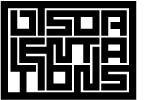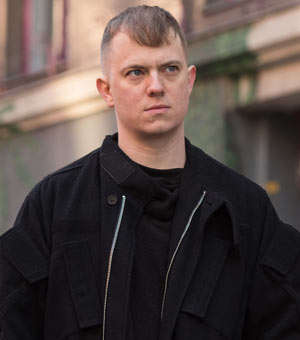HAU Curator Stefanie Wenner interviews Travis Jeppesen about DADDY
by Travis Jeppesen on June 1, 2009
SW: DADDY is the title of the play that you wrote for our Festival “Your Nanny Hates You!” Fathers seem to be more and more absent, the construction of the postmodern family seems to move beyond the older notions of the threefold of father, mother and child. What do you think: Which place does the father have in the contemporary construction of the family?
TJ: When I hear the word “family,” it still calls to mind the archetypal three-part structure, as I believe it does for most people. In that respect, I don’t think the traditional notion of the family has changed all that much – as a pure semantic concept, that is. I think you’re right in assuming that it is more useful, then, to explore the changes of the individual roles stuck in that triangle. But I think Daddy is necessarily more suggestive than explicit in its positing of a New Father type.
SW: Religion is important for the story told in DADDY. Do you think it still plays an important role for contemporary ideas of family?
TJ: The way religion plays out in Daddy is quite specific. I’m interested in the ways that familial formation occurs outside of the classical Freudian triad (as discussed above.) This has a lot to do with being a societal outcast – being in a position where you feel that you’re forced to create your own family. This seems to be what happens in a lot of new religious movements, referred to in common parlance as cults, one of which is at the center of Daddy.
SW: The frame of the whole Festival discusses questions of intimacy and economy, the correlations of work, public and private life. How does DADDY fit in the frame of these questions?
TJ: For me, the question is: What is “private”? In our relations with others, how do we manage to properly cordon off certain interactions, while allowing others to be carried out in full view? The sexual revolutions of the ‘60s and ‘70s projected a world where fucking in the streets would become a norm. Only those of us dwelling in the Thought Ghetto seem to remember these promises. With the rapid expansion of technological possibility, previous definitions of privacy – and self-exploitation – are no longer valid. Anyone can be a porn star now; it’s not a taboo subject anymore. Has this expansion/intrusion into the private aided us in the project of self-knowledge? That’s one question that comes up in Daddy.
SW: When it comes to caretaking, neglect and incest seem to be close relations. How does DADDY tackle these issues?
TJ: Well, it is for this reason that I feel that Missus Pringles, the mother, may be the most interesting character in the play, because she certainly is forced to take on this schizo project of parenthood. Care ultimately begins with the self, then extends outwards; “good parenting” seems to deny this, in denying the primacy of the self and privileging the child as the only extension of the self that should matter; it’s built on a rhetoric of sacrifice; you know, “Save the Children,” “I Believe the Children Are the Future,” all of that sentimental bullshit.
The examples of “bad parenting” I most often witnessed while growing up in suburban America in the 1980s were the exact opposite situation, and came out of the damaged pseudo-ethos of the “Me Generation” of the decade prior. It rationalized parental neglect in the pursuit of “self-development,” reasoning that this will somehow make one’s children grow up to be strong, independent adults.
There are serious problems with both of these models, and Missus Pringles doesn’t really fit into either. Rather, we watch her struggle with the multiplicity of roles she has accepted – mother of Denny, wannabe actress, wannabe spiritual being, etc. – her struggle to cohere as an individual. She winds up using her son not merely as an extension of her own being-in-the-world, but as a sort of weapon against that world. Is there a sexual component to this? There’s no incest, per se, in the script – at least it’s not overt. She refers indirectly to the Josef Fritzl incident in one of her monologues, but I think that’s as far as it gets. Perhaps this question will re-emerge in the rehearsal process, I can’t say now for certain.
SW: What else interests you about the project?
TJ: I view the project as an opportunity to further interrogate the supposed discrepancies between the mundane and the numinous, two poles that have been at the center of my work for sometime now – the way in which they in fact enclose, rather than oppose, one another. I believe that Ron Athey has deeper insights into this question that will prove to be very illuminating. I’m interested in the shifting values of the “white world,” which is why we’re deliberately stating that the setting of the play is Europe and/or America. And I’m interested, if not slightly intimidated by the prospect of collaboration, simply because, as a writer, it is new to me.
SW: Mothering is a construction, that has been widely discussed by Elisabeth Badinter, the French philosopher who wrote on motherly love. Emotions and intimacy seem to be constructed in general. How does this affect the postion of the father in DADDY?
TJ: Perhaps it emphasizes that large part of the play wherein the father is absent. It reinforces the absent father’s haunting of the world that the play takes place in.
SW: The Christian religion is a father religion and defines the father as absent. How productive is the presence of the father in DADDY?
TJ: The “daddy” of the title is an 11-year-old boy, who, fatherless, becomes a father himself – and then, by a certain turn of events, doesn’t. The other father, I suppose, is Preacher Creacher, the leader of the cult, who instills himself as a fake father over others – yet his sincerity is ambivalent throughout. So the figure of the father goes through many cycles of presence and absence throughout the course of the play. In this sense, I’d say it’s quite productive – we’re gonna make a lot more daddies than we are babies.


Leave your comment